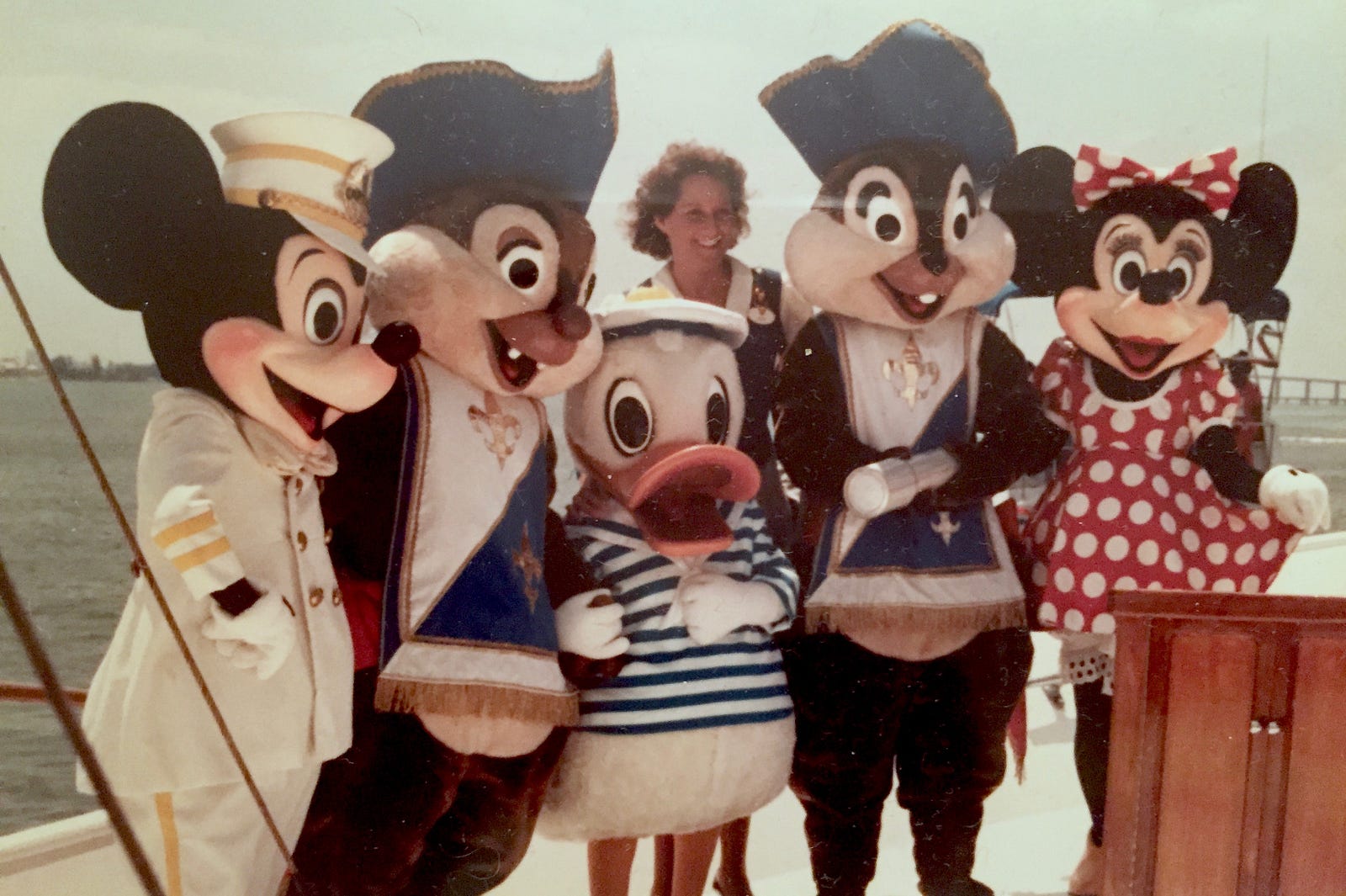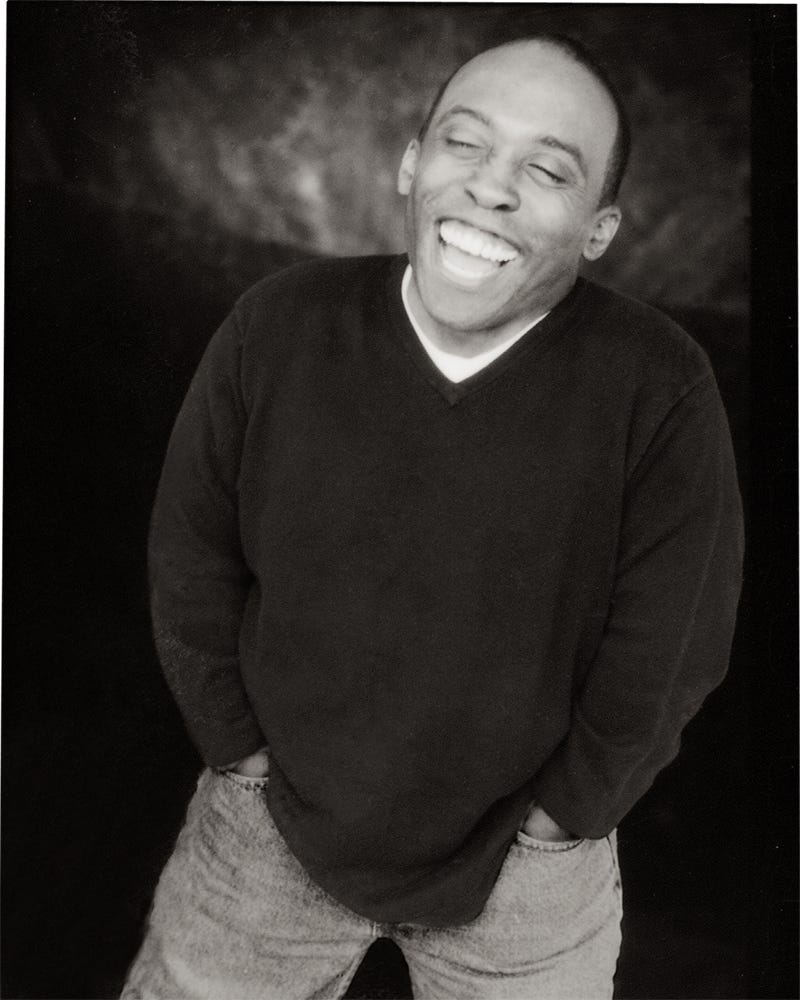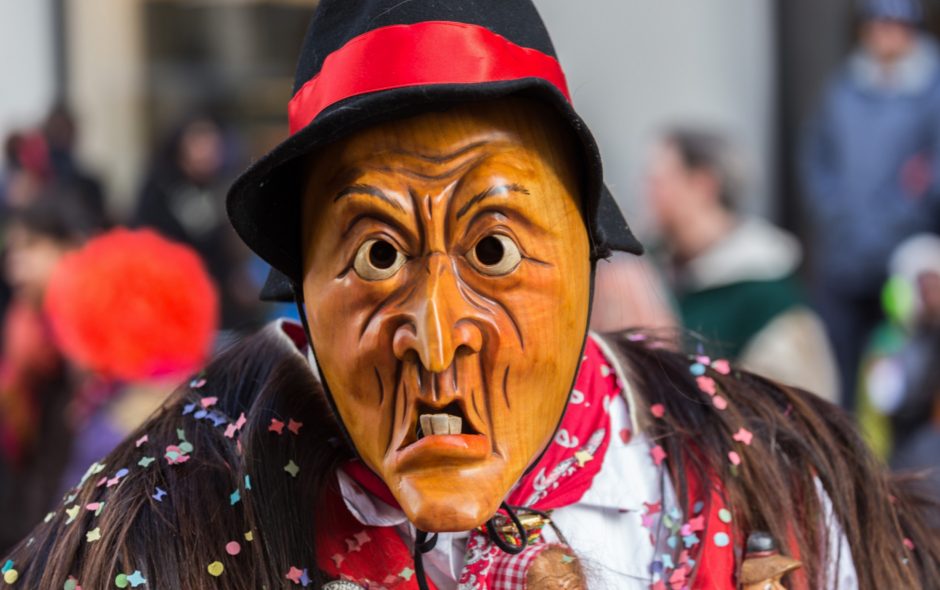The best time to pretend to be someone else, is when you’re being paid to do so. Or if it’s just for fun.
In my mid-twenties, I worked as a costumed character (Donald Duck) at Walt Disney World near Orlando. It was nowhere near the job I wanted. I had my eyes set on a career in marketing; but since I fit the costume, had a theater minor in college, and needed the money, I accepted their job offer. And excelled at it. During my time working in the Magic Kingdom, in a job I initially loathed, I was taken to school on one of life’s most enduring lessons: the importance of self-acceptance.
After my Walt Disney World orientation and three days of specialized Entertainment and Character training, the company turned me loose in the Magic Kingdom and paid me to pretend to be someone I wasn’t. I learned certain mannerisms, behaviors, developed my own exaggerated walk, and learned to mimic a well-known personality.
To make the illusion complete, Disney gave me an expensive costume, with a mask (okay, technically it was really a “head,” but you’ll see how the term “mask” better suits my purposes), and duck feet to shield my identity from the public. And lo and behold, I successfully delude the public into believing that I was not a short, black man working his way through college, but one of Disney’s most iconic characters, the irascible Donald Duck.

Art Imitating Life Imitating Art
The irony was that just as Disney had given me a head-to-toe costume to mask my true identity from tourists, I hid my true self from the people I encountered everywhere else. I crafted a game face that presented the visage of a person who had his act together. I played the role of the guy next door who doled out engaging conversation, witty jibes, and dug deep into other people’s psyches without revealing much, if anything, of his own. I wanted to exceed their expectation for fear of them not liking the real me.
The repercussions associated with the prolonged use of masks in real life are far-reaching in that they affect the wearer and their relationships with others. Here’s a few—
Wearing masks is exhausting. Crafting and maintaining a proper game face is a lot of work. The energy necessary to bring an A-game — gearing oneself up for interactions and being constantly witty, charming, and/or likable — take a toll. Masks prevent people from genuinely reacting with you. Your mind inevitably will jump through all sorts of flaming hoops to try and not only anticipate people’s reactions, but to plan a couple of maneuvers of your own ahead of theirs.
Wearing masks leads to emotional detachment. Sustaining a desired public persona leaves little energy for involvement in meaningful or authentic relationships. Keeping everyone at arm’s length makes it difficult for people to get to know you. That’s not to say that won’t have any close relationships. It’s possible, but they will be few and far between. (Mind you, I’m not referring to that initial guardedness or reservation in sussing people out. I’m referring to a perpetual decision to keep everyone out.)
When people invited me to join them on outings, I usually declined. This made my rare appearances push me further into the spotlight. “Oh, look! Clay’s here!” No matter how people tried to reach out to me, I didn’t reciprocate as I interpreted their invitations as disingenuous because they didn’t know the real me. And if they knew the real me, they definitely would not like me. It all became a self-fulfilling prophecy of superficial relationships that led to more isolation.
Wearing masks can lead to a compartmentalized life. Compartmentalized life. I took my use of masks one step further in that I created a collection of masks — a fun-loving, with-it mask for work; a modest, mild-mannered mask for church; and a compliant, people-pleasing mask for family — all of them concealing a pained and weary guy underneath.
Show Your Face
Before I could show my face — actively engage others without a mask — I had to believe in my heart of hearts that I was okay, good enough just as I was, without enhancement or diminishment affected by myself or anyone else.
The problem was that I had a tendency to listen to my self-doubt playlist day and night. In order to get a new, different, and better self-image, I needed some input from an objective source. So I sought out what God, the source of all truth, had to say about me in his word.
I am loved by God. I think for a lot of people this idea is as easy to grasp as quantum physics. It’s taken me a long time to be able to begin to wrap my feeble brain around this concept. Honestly, as long as I’m on this side of eternity, I don’t think I’ll ever fully grasp what being loved by God means. But what I can kinda-sorta grasp is what God says about his love in the Bible.

“Do not fear, for I am with you; do not be dismayed, for I am your God; I will strengthen you, I will help you, I will uphold you with my victorious right hand.” —Isaiah 41:10 (NRSV)
Knowing that the Creator of the universe is with me, and concerned not only with my spiritual state but with my physical, mental, and emotional states as well, is willing to come to my aid, and he has my back is a lot more comforting than me thinking you’re on your own, kid. So it stands to reason, if God can find me lovable and is willing to go to bat for me, who am I to stand in the way?
I am created in God’s image. While there are a myriad of people who would think less of me because of my height and/or race, not to mention that on some really bad days I can go there all on my own with no help from anyone else, the external me is of no consequence to God at all. And if it’s not an issue for him, why should it be for me? What about you? Is there something about yourself you think people judge you on?
And you know what else? When you’re able to accept yourself, it’s makes it a whole lot easier to accept others.
Embrace your strengths as well as my weaknesses. When I lived in Los Angeles, I attended a workshop specifically designed to help actors discover their specific personality traits that set them apart from everyone else. Everyone could spot the other attendees’ personality traits much more easily than their own. One adjective participants used repeatedly in reference to me was “sweet.” That’s one of the last words I would have ever used to describe myself. Salty, maybe. But sweet? No, thank you.
After much discussion, I came to understand that my fellow participants meant amiable, friendly, or downright neighborly. Once I got beyond the word “sweet,” I embraced the idea that the perception of me as friendly was accurate. (It’s amazing what you find out about yourself when you stop hiding behind masks.)
I am forty-eight inches tall. And black. Try if I like, I can’t do anything to change either of those facts. They are immutable. I can’t take a pill or undergo some outpatient procedure, and no amount of head-shrinking therapy will change that. So that leaves me two options. I can either wallow in self-pity and allow my height, race, or anything else others might see as negatives to exclude me from certain aspects of life OR I can embrace those traits and make them my greatest assets. Guess which option I chose?
Be who God meant you to be and you will set the world on fire.
– Catherine of Siena
Face Your Show
You’ve already been cast as the lead actor in “The Story of You.” There’s no one who can play that role better than you. You were born to be you. So why not be yourself in the role you were born to play without a mask and bring all that fabulousness with you?
If “show your face” is preparing to live your life without a mask, “face your show” is the act of living your life without a mask. And facing your show consists is basically this—
Make Perceived Challenges Work for You. In the case of my height, I know that roughly one out of every 100,000 people is affected by some form of dwarfism. And when people see anyone out of the ordinary — due to their height, weight, attire, skin color, hair, or lack of hair — they’re going to look. Stare even. I embrace the challenge (the fact that I am forty-eight inches tall) by also accepting the reality that there will be a myriad of verbal and non-verbal reactions from others upon seeing an adult male standing at forty-eight inches tall — some cool, some flat-out rude, and everything in between — but I know that I am loved by God, created in His image. And while I can’t control their reaction, I can control my reaction to their reaction.
So how do I use that to my advantage? Well, since I know that I’m an attention-getter, I can use my visual hook as the cause célèbre (or platform, as publishers like to call it) to leverage my message by any number of means. Perhaps, in one-on-one interactions, or maybe an article.
Be all that you are and strive to become all that God created you to be.
Maintain healthy boundaries. This comes down to knowing who I am, what I stand for, what I’m responsible for and what I’m not. This also includes how I will treat others and how I will allow others to treat me.Without these parameters, it’s easy to find yourself hijacked into all sorts of situations you have no interest in.”
Remember that you are not your circumstances. I went through a painful period of abject unemployment. I have a bachelor’s degree in Communications from a respected college. My professional experience is impressive by anyone’s standards. And I like to think I am easy to get along with. But I couldn’t find a job to save my life. I applied all over town. Friends introduced me to people, hollow promises were made, and potential leads turned into dead ends. I’d like to tell you that it didn’t faze me in the least, but it did. I felt completely discarded by society. But thankfully, I had friends in my corner who reminded me that I, along with my skills, talents, and abilities, were still as valuable as ever.
Cut yourself some slack. For most of us, it’s easy to forgive others when they make a mistake. We all make mistakes that impact others. And it doesn’t take a board certified psychiatrist to realize that sometimes people are put in trying situations that impact others negatively through no fault of their own. Life happens.
Now if we would allow ourselves a similar margin of error. There are plenty of naysayers out there poised and ready to shine a spotlight on my missteps or bad decisions. It’s a lot easier to own my mistakes, forgive myself, and try to do better the next time.
Showing your face is not about living on the outer fringe of decency, saying and doing whatever you like. It’s all about embracing who you are, like and dislikes, strengths, and weaknesses, and having a healthy self-image that’s rooted in a divine identity that is not subject to the whims of trends, public opinion, and self-doubt. Facing your show — that actual living without a mask — involves confidently interacting with people in a manner that allows for and forgives mistakes. Theirs and yours.
When we embrace ourselves for who we really are, it shows others that we are comfortable in our own skin. We’re self-aware, and that’s okay. It also gives them permission to embrace us, and sets them at ease to be themselves around us.
Love one another.
Excerpted and massaged from the book, 3 Things I Know: Facing and Embracing Life’s Challenges by Clay Rivers.

